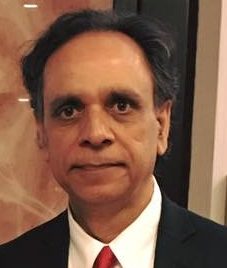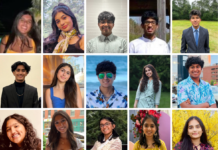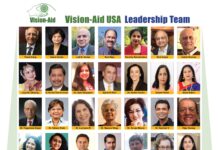By Upendra Mishra
BOSTON—In 1976, I was in the 11th grade at the Government Inter College in Lakhimpur Khiri. One day while returning home from my classes, I noticed a tiny music school from where I could hear sweet sounds of sa re ga ma pa, sitar, harmonium and tabla. One day I walked into the music school and enrolled myself to learn singing. I still remember I was so excited.

It was a one-hour class, starting at 5:00 pm from Monday through Friday. About a month after I had started my music class, my aunt (for all purposes my mother) noticed that I was coming home one hour later every day. She told that to my uncle. He did his research and discovered that I was learning music. He went straight to the music school and pulled me out of the class. “No singing in our family,” he said. “Singing is for the street people, for the workers who work in our farms and fields and not for families like ours.”
Today, I did just the opposite. My youngest daughter, who is in the 11th grade this year, had asked me that she wanted to learn Indian music. Today, I took her to the LearnQuest Academy of Music in Waltham. It was her first class, and Oh My God! She loved it. “I liked the Indian music better than the Western,” she said. I asked: why? “In Western, you have fixed notes and in the Indian music you can glide through the notes,” she answered.
While I was driving home, I told her my story of learning music. She asked for more and then I went back to my childhood and tried to remember every detail I could. She said I should write it. So, here it is.
I come from a typical Brahmin landowner family in Eastern Uttar Pradesh. My grandfather had a lot of land and plenty of workers used to work there. One of my best memories are the rainy season and the planting of paddy saplings. The dark clouds of monsoon season would be hanging over, sometimes with pouring rain; and the entire family of the farm workers (husband, wife, children and their grandchildren) would be planting the sapling in deep muddy water. While planting, they would be singing on the top of their voice amidst the rain and roaring thunder. That rain, low lying clouds, rain water, songs and planting are still vivid in my memory. During the paddy planting season, my grandfather, myself and some of other family members would visit the fields to see everything is going ahead as planned.
That was my first exposure to songs. Pure songs, no music, nothing; just pure expressive and melodious voice. As I grew up and started to go to the primary school of my village, every Saturday there will be an assembly of all kids and teachers together. Those kids, most of them still live in my village, will come out of the crowed and would sing one by one. My job was to invite them to sing. When we would take our buffaloes and cows for grazing near the village river, those kids will sing. I wanted to do that. One day I was imitating them, and somehow my granduncle came and stopped me right there and brought me home.
It was not that my grandfather did not like music. He adored music and, in fact, a song had a big impact on him. I was eight or nine year old and I was sitting next to him one afternoon. He was deeply engaged in conversations with his friends. He was telling them about me and the death of my mother and sister.This I vividly remember, and I think my grandfather was not aware that I was paying attention or I was understanding what he was saying. But I did.
“After I had brought babu (he called me babu) after his mother had died in her parent’s village, I was very sad,” I remember my grandfather telling his friends. “I was thinking what will happen to this poor boy? Who will take care of him? How will he survive? What should I do? How should I give him his mother. Every day he asks: when will my mother come; I want to see my mother. Every day I tell him that she will come tomorrow. How long I am going to keep saying this to him?”
He continued: “Then, from a near distance one day I heard a song Nibulal (one of our servants) was singing a Kabir song at the top of his voice : aya hai so jayega, raja rank fakir (Who has come will go, whether he is king, pauper or fakir.) After listening to this song, I suddenly woke up, my all sadness washed away. I stopped worrying about babu instantly. That Kabir doha changed my life.)
But despite such an impact music had on my grandfather, he would not allow singing in my family. My hankering for singing, nevertheless, continued. I must admit, however, that I had a terrible voice. I had repressed my singing craving so much. But still when ever I got a chance I would hmm; although I never liked my own humming. When I was in the Allahabad University, my roommate, Pawan Kumar Singh, would always tease me: “Upendra, I like your humming.” I always tool it with a grain of salt.
When I joined Jawaharlal Nehru University (JNU), I used to hmm a Silsila movie song: Ye kaha aa gaye haam.” Almost after 30 years when I connected with my JNU friend, Sriram Srirangam, his first question to me was: Upendra, do you still hmm ye kanha aa gaye hum song.
Finally, about four years ago, I enrolled myself at the LearnQuest Academy of Music in Waltham to fulfill my childhood dream of singing. In four years, I have missed only one music class. I really enjoy practicing sa re ga ma pa, and have not yet moved beyond that. Now, however, I can hmm a few songs and enjoy my own humming. This iswhat I always wanted.
As I was telling this story of my desire to learn singing to my daughter, I remembered a story from Brihadaranyaka Upanishad. There is a beautiful discussion between King Janaka and sage Yajnavalkya.
When sage Yajnayalkya visits the court of Janaka, the king asks him: What is the light of man?
To this, Yajnayalkya explains different type of lights to Janaka in an order: from obvious to subtle: sun, moon, fire and speech. “Even though we cannot see our own hand in the dark, we can hear what is said and move toward the person speaking.”
Janaka asks: “When the sun sets, Yajnayalkya, and the moon sets, and the fire goes out and no one speaks, what is the light of man?
Yajnayalkya: “The Self indeed is the light of man, your majesty, for by what we sit, work, go out, and come back.”
Janaka: “Who is that Self?”
Yajnayalkya tries to describe the Self to Janaka through various examples, and towards the end he makes it so simple that even a common man can understand the true meaning and feeling of Self-Realization, and uses the example of love.
Yajnayalkya says: “As a man in the arms of his beloved is not aware of what is without and what is within, so a person in union with the Self is not aware of what is without and what is within, for in that unitive state all desires find their perfect fulfillment. There is no other desire that needs to be fulfilled, and one goes beyond sorrow.”
Janaka: I give you another thousand cows! Please teach me more of the way to Self-Realization.
Yajnavalkya: “As a person acts, so he becomes in life. Those who do good become good; those who do harm become bad. Good deeds make one pure; bad deeds make one impure.” “You are what your deep, driving desire is. As your desire is, so is your will. As your will is, so is your deed. As your deed is, so is your destiny.”
(Mr. Mishra is managing partner of the Waltham, MA-based integrated inbound marketing and PR firm The Mishra Group. He writes about his three passions: marketing, scriptures and gardening.)















